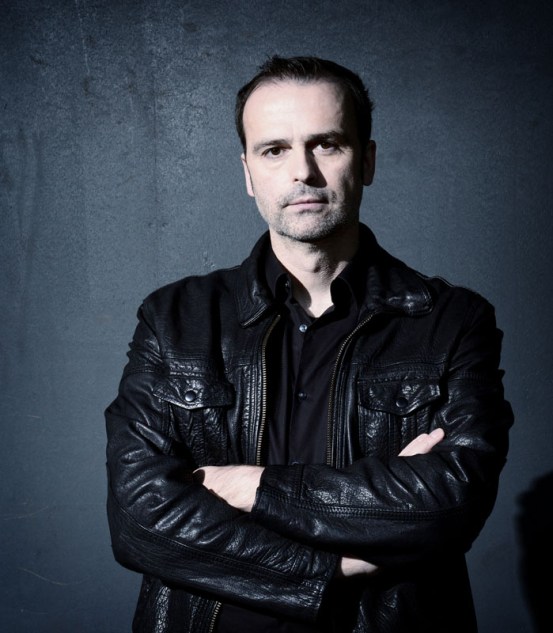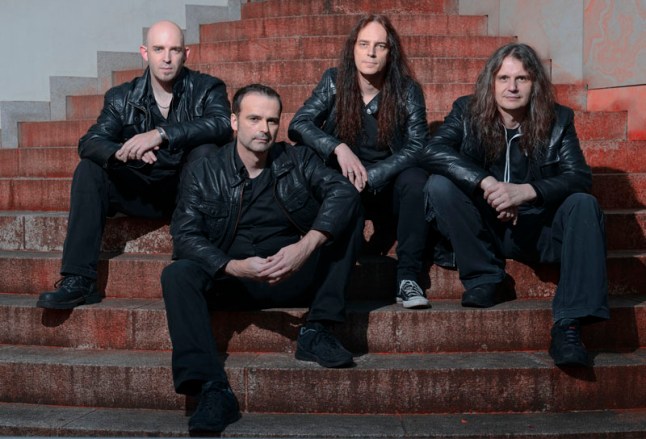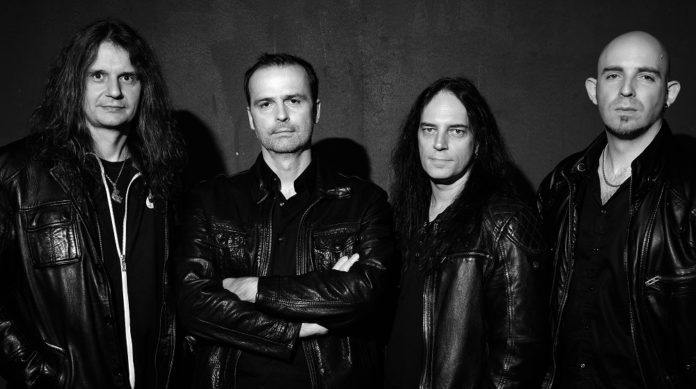It’s not secret that I’m a big fan of J.R.R. Tolkien, so being a fan of Blind Guardian was simply a natural thing for me. Then again, to be completely honest, I didn’t even know that they were just as nerdy when I started listening to them (although their cover art should have probably been an indication!) and was absolutely blown away by “Mirror Mirror,” without even knowing that it was about the Tolkien mythos. From that first exposure, years ago, their popularity has soared, and they’re at the forefront of power metal.
As one of the most important power metal bands today, and riding on their success with their latest album, Beyond the Red Mirror, I was looking forward to meeting with the great Hansi Kürsch, the singer and founder of this German powerhouse.

MB: Beyond the Red Mirror was an album that people expected for over 4 years, but it’s also a story that started over 20 years ago, with Imaginations from the Other Side. Can you tell me this story?
Hansi: In Imaginations from the Other Side there was a story told in the song “Bright Eyes” and “And the Story Ends”, about a young boy in a world similar to ours, who lived a very isolated life. Parallel to his universe there was another one, which had this more fantastic themes and attitudes. These two universes were connected via several magical mirrors, and the Boy, who was the chosen one, was supposed to jump through one of them. In “And the Story Ends” we left the boy standing in front of the mirror, about to jump through it.
When we were working on the music for this new album I felt that there was an atmospheric similarity between the new songs and those from Imaginations from the Other Side; disturbing elements, yet shrouded in a magical and classical grandeur. At the time I was reading Stephen King‘s Dr. Sleep, where he revisits the main protagonist of The Shining, which reminded me about how I still had that Boy in front of that mirror. This me think about how the story could have moved, and that’s when I got the plot for Beyond the Red Mirror: the Boy who was supposed to jump doesn’t jump, he just stays where he is because he is afraid, which brings negative consequences to both universes.
In the album I first describe the two universes and their development, and then I go back to the Boy, who by then has become a man, who figures that something has gone wrong in his life. He is supposed to find out a lot of things about himself and accomplish his mission. What we witness is his personal quest for the holy grail; it’s this sort of modern King Arthur story, with a slightly different output.
MB: I feel that this new album is one of the most ambitious productions you’ve done so far, because you worked with 3 choirs, 2 orchestras, and the songs are longer and more complex. Is it risky for a band to increase the complexity?
Hansi: For us it was a natural progression, it wasn’t something we really thought about. When we brainstormed for the album perhaps my ideas were a bit less complex than what ended in the album, while Andre Olbrich’s [guitarist] ideas were probably even more complex. We are both the main composers, and so the album is just a mix our ideas.
It’s not that we don’t want to do an album like Imaginations from the Other Side or Somewhere Far Beyond; it’s simply that it didn’t come out naturally. At no point have we paid any attention to whether something could be commercial; we feel that we have to be “educating” the listener in the sense that he must be ready for something that maybe he didn’t expect. This is one of the goals in our songwriting, to not repeat ourselves, and to surprise both ourselves and the listener.
I feel that nowadays music in general is fairly predictable; you know what you’ll get, regardless of what artist you’re listening to, and we don’t want to be like that.
MB: Well, I think that Beyond the Red Mirror really didn’t feel like you were rehashing something. It’s really nice to see that you don’t sit on your laurels and just repeat yourselves.
Hansi: That’s our goal; if we accomplish that then I can even live with failures. Pleasing our fans is almost impossible, because the variety of our songs and our styles is such that you simply can’t please everyone with every song, but we feel that it’s a necessity to widen the dimensions of Blind Guardian. We are very grateful that most of our fans and listeners are willing to go that way with us, since that’s not what normally happens; it says something about the people who are into our music.

MB: Since Nightfall in Middle Earth it has been a staple of the band to use orchestras in your music. How was it for you to start working with that type of musicians, with that range of instruments? How did it affect the composition?
Hansi: Back in Follow the Blind we were already using some classical instruments, even though they had a minor role. Ever since then we’ve tried to use them if the need arose, but we never considered them to be an essential part of Blind Guardian… the thing is that once you have a keyboard and you have the possibility to experiment with it, you do it, because it’s a way to improve your skills as a composer, and to widen your imagination as both a music fan and a musician.
This was followed by “Theatre of Pain” in Somewhere Far Beyond, which was our first real attempt to do something classical; we then did some more elaborate stuff in “A Past and Future Secret”, in Imaginations from the Other Side, then in The Forgotten Tales, and so on and so forth.
We have improved our skills, and we feel that this is a way for us to express our new personality. For us it’s just a natural thing; it goes very well with the fantasy attitude of our music, and it also goes very well with heavy metal. Many metal bands have a classical intensity in their songs; some use classical orchestras, some do it in a more “metal” way, but it’s certainly a part of metal music.
Of course, by working with people like Matthias Wiesner, who was in charge of keyboards until A Night at the Opera, and later on with Matthias Ulmer, who has been helping us since At The Age of Time, we have learned a lot. We do the core arrangements, which gives most of the ideas to the orchestra, but they are the ones who make sure that they are in accordance with classical theory. By working with these guys we have been educated and learned a lot about how to use these instruments.
While this goes all the way up to Beyond the Red Mirror, it is also an essential part of our orchestral project. We work on this because it is a passion for us.
MB: Tell me about this project; the last thing I had heard about this project was that it was called “Dwarves”….
Hansi: [laughs] Not exactly; we work with Markus Heitz, the author of The Dwarves. It might go into this universe, but this is something that we need to talk with him about the way in which we will progress. There is no title at the moment.
MB: When you speak about this being an “orchestral” project; do you mean that it will be 100% orchestral, or is it still a metal band working with an orchestra, like Yngwie Malmsteen did with some orchestras?
Hansi: I think that the arrangements and the composition is metal, but there is only an orchestra playing, and I do my vocal arrangements over it. It has nothing to do with any of the other bands have been doing recently, nor with what we’ve done in the past. You’ll have a musical feeling that I hope people will enjoy, but it’s a step forward from Beyond the Red Mirror.
MB: So no electric guitars, bass and drums? No band?
Hansi: Based on what we’re doing at the moment, no; but we might do that in a second step, it’s something we’re discussing, because if we’re talking about a live situation it definitely makes more sense to have the band involved, instead of just me standing on stage with an orchestra. I guess that’d look silly! [laughs]
I don’t miss the guys in general, but at that particular time I’d miss them a lot! If we do the live performances I’d appreciate to have them on stage. [laughs]
MB: You think you’d start feeling a bit self conscious?
Hansi: Yes! I would feel very insecure, because it’s still something different to have a good conducting drama, like Fredrik Ehmke [drums] does, since he can easily conduct me through such arrangements, instead of trusting a conductor I’ve never worked with. While the recording are themselves a challenge, I’m used at doing that, and I’m confident about it; but having an orchestra behind me, and performing on stage alone… that would be an issue, at least right now.
The songs definitely have the potential to work with the whole band. “Wheel of Time”, for example, from The Edge of Time, is actually one of the songs that we had planned to have in the orchestral project; it’s just that I felt that it lacked something, and so I suggested Andre that we add a metal arrangement to it, which in the end turned out very well. I imagine that at leas 75% of the songs that we’ve written so far for this project could make the same progression, so in the next stage this might be a good idea, and it might even attract more people than just the classical music. For us it’s interesting to have this output as it was originally intended.
MB: Since we are out of time, and since literature plays such a big part in your music: What are you reading right now?
Hansi: The latest part of A Song of Ice and Fire by George Martin, and I just received the last of Markus Heitz‘s books, so I just started that.
MB: You usually stick to fantasy books?
Hansi: [laughs] No, definitely not. I read a lot of history books, but I’m still thrilled by good fantasy, so whenever something good comes up I will eagerly read it.
MB: Thank you so much for your time; I’m looking forward to checking out your new projects.
Hansi: Thank you; see you soon!

